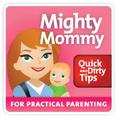Positive Language in Discipline
My son has been four for almost a year now. He doesn't like to listen to me. He doesn't like to listen to his dad, or Gramma, or his swimming teachers. He's becoming entirely too independent. It's frustrating for all of us. When he's doing things we don't approve of, it's hard to stop ourselves from saying things like "Don't hit your sister," or "Don't throw your Legos." All he hears is the part where we say "Throw your Legos," apparently. It's time for us to restructure our language again to focus on more positive words. Instruct Your Child Instead of Threatening or Demanding Using negative words like "don't pinch" and "no hitting" seems to remind kids what types of negative behaviors are available to them. So, I recommend using positive words. "Walk away." "Go play in your room." "Let go of his hair." It's a very simple technique and works amazingly well for me when I remember to use it. When you speak in a firm voice and avoid threats, kids tend to cooperate better. When they're given easy instructions instead of threats or loud demands, kids won't feel as though they are pushing your buttons. If their actions are negative-attention driven, positive commands won't give them the desired reaction, and they will have to make a choice. If they obey, then reward them by thanking them for listening. You appreciate it and you should let them know.
Practice Positive Communication Another thing to remember is that it's always better to use as few words as possible. Kids are simple. They don't need long explanations as to why they shouldn't pinch each other. They know it hurts. If you want to explain it to them, do so when you have their full attention and they're interested in listening. At the moment when you want them to stop, tell them to stop by instructing them to do something else. Be brief and very specific. When I tell my son to "play with the Legos properly," he seems to listen better than if I simply acknowledge his bad behavior of tossing them around the room. Also, by asking him to play properly, I'm giving him the opportunity to be praised for following instructions. Being specific about what your child SHOULD do instead of what he shouldn't is a much more positive way to communicate. If your child is pulling his brother's hair and you tell him to stop, he might stop for a moment, then just do it again. Saying something like "put your hands in your pockets" may solve the problem. If you don't have any idea of what you want to say, but you need to stop the behavior, have your kids put their hands in their pockets, at their sides, or even on their heads. They might think you're crazy, but it can stop the behavior and give you a moment to think of the next instruction. Don't Be Afraid to Say "Stop" Finally, I do believe the word "stop" can be used in a positive manner. When your child is doing something that you want them to stop doing immediately, the first thing you can say is "STOP!" Say it firmly and loudly if necessary. Get your child's attention quickly this way and then, give him a brief instruction. If you are walking at the park and your child is walking too far ahead ask him to "stop," and then follow with "stay next to me" or "hold my hand." Remember: simple, brief, and positive commands will usually yield the most positive results.
Congratulations, House Call Doctor Please join me in celebrating the one-year anniversary of Dr. Rob Lambert's show, The House Call Doctor. You can congratulate Dr. Rob on over on his Facebook wall. Post a comment or question on his wall before the end of the month and be entered to win free books and audiobooks from Macmillan.
That's it for now. I hope you've enjoyed the show. If you'd like to request a topic for the Mighty Mommy you can e-mail me directly at mommy@quickanddirtytips.com. This is your friend the Mighty Mommy wishing you happy and fun parenting!

